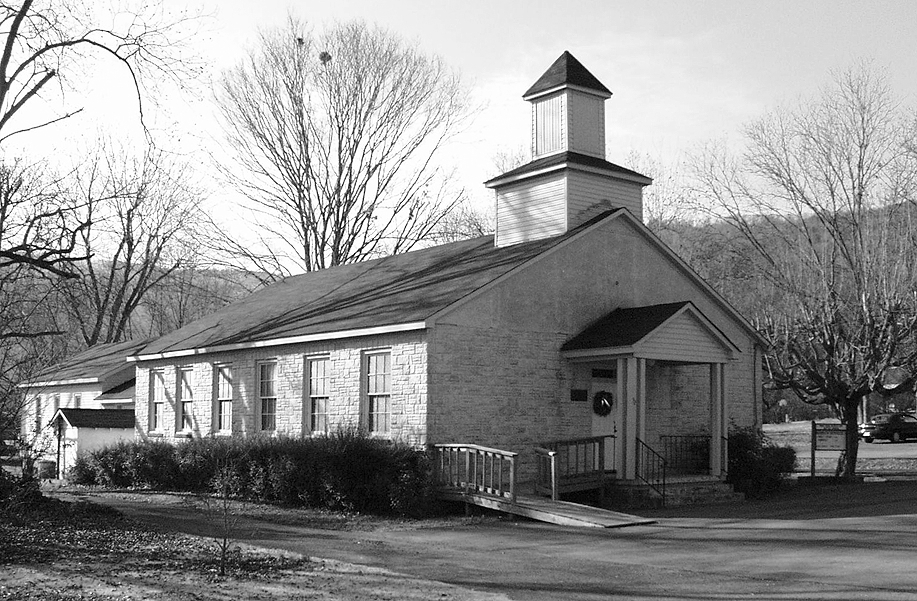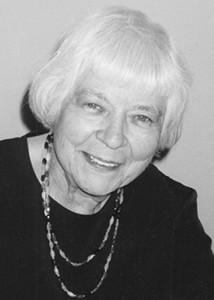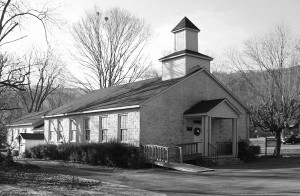
Feb 21, 2014
“The Lord would not let me not come to church!”
An interview with Grace Rabatin
By John and Ellen Griffin
Members of the Paint Rock, Ala., SDB Church (and the Sabbath Recorder Committee), John and Ellen Griffin took some time to interview longtime church member Grace Rabatin. Over the years, the Paint Rock church faced the ups and downs of struggling attendance, and Miss Grace provided her perspective.
Q: Miss Grace, how long have you been attending church in Paint Rock?
Since 1945—except it was at Athens, Alabama, then. We had to go over there every week. Mother Butler’s parents lived over there but they were both ill. It was easier for us to go over there than for them to come over here.
Edgar Wheeler was at the seminary in New Orleans at the time. He’d ride up on the train overnight Friday from New Orleans, get here on Sabbath morning, we’d have church that day, and then he’d go back that night.
Q: How many people were attending church there?
Mother and Dan and Betty, and Bobby and I and my two children. Charlotte’s daddy and his wife; Charlotte’s parents and the children. About 15 in all. We used to go to Athens one week and here one week and Princeton one week. It was just the family.
So since 1945 until that time… When did the church move to Paint Rock?
The church moved to Paint Rock in 1952. After Edgar Wheeler came Brother Soper, Mynor Soper’s father. They were just wonderful people. They knew so much because they had pioneered in Nebraska. He lived 30 miles from the railroad in Nebraska. Once a month he would take his wagon and team of mules and go to get his supplies and do her shopping. She was just the most fabulous person. She’d go out to do her chores and would put the hem of the toddler’s dress under the table leg so that she couldn’t get into anything dangerous.
During those years when you were going to church, it was just in people’s homes?
Yes. After the grandparents died we met at a small community building over in Athens called Oakdale. We had church there and then we met over here at a small community church near the Butler’s house. It was a little country Baptist Church. Mother Butler kept that church alive for many years.
Was the Paint Rock church meeting in the current building?
No, Brother Soper built it the second year he was here. He was overseer of that. Mother Butler had lost her son in the war and she was going to build a church in honor of him. But everybody else—the Suttons and some of the Bottoms—didn’t want her to do that. They wanted to get a loan so that everybody would have a part of it. But she said no, and she did it her way. Nobody really felt obligated, or as much a part of it, as they would’ve been if they had borrowed some money and everyone paid on it.
How many people were attending at this time?
Well, I guess 30 or 40. Mother Butler did things in the neighborhood. She had a little choir and made robes for them, and they sat up there and sang and sang and sang. We bought a bus, really a candy truck from Allison Candy Company and put a seat in it. They went around the community and picked up the kids. Mrs. Butler had a Nash Ambassador and she had 19 children in that thing at times! She’d pass by the house and you couldn’t see through it! She had kids in the front, kids in the back, and kids in the trunk. I tell you the Lord sure took care of many things.
Mother Butler’s house was like Grand Central Station. If anybody in the denomination was coming this way they knew they’d have bed and breakfast and Sabbath at the Glendale Farm.
Not a lot of adults in the community came, just mostly our family. But we had lots of children!
After Mother Butler passed away, what happened to the church? Did the attendance drop off then?
Yes, she died in 1981, I think. Ms. Garrett had come down here. Now Ms. Garrett was a little World War I retired Army nurse. She lived in Chicago and read about the Paint Rock church in the Sabbath Recorder. She got everything in order, got on the bus and came down. She didn’t know us from Adam’s house cat. She said later, “If I had known it was such a weak church I never would’ve done it.” But she was a very strong woman. Mother Butler had this little travel trailer and Ms. Garrett lived in it there for a while. Then the people next door to the church made an apartment for her. She taught the children’s class on Sabbath.
So you had a children’s church then?
Yes, she taught the children’s class.
When there were so few people coming here, what was your motivation to keep the church going? There was a time when there was just you and one or two others, right?
Well, I can’t take any credit for it. Everybody quit. The Allens were gone, I lost Bob in 1972. Then five years later I married Mike.
Pastor John Bevis had been at the SDB headquarters in Plainfield, New Jersey. He was here for about five or six years, and people started coming back when he came. Then he went to Denver.
Before he came back the second time, there were only a few of you. What kept you motivated? You could’ve been like everybody else and quit.
Well, actually the Lord would not let me do that. I kept telling myself all during that time, “Nobody is going to be there, why do you keep doing this?” But the Lord would not let me not come. I can remember the first time I’d ever driven on ice, on an icy bridge. On Friday I called Louise and told her, “Go turn the heat on—I’m going to church tomorrow” and I came.
I kept coming and I kept coming. Sometimes Louise would come, sometimes Ila and Ida. And Katherine. I don’t know, the Lord just wouldn’t let me give up. But I felt like it many, many times, especially when it was cold.
So you were the one who kept it going.
Well, I just came. Everybody else came when they could.
Did you all sing songs? Did you have praise and worship, or read out of the Bible?
I think we read our Sabbath School lesson. We didn’t sing, I don’t remember singing. We didn’t play the piano.
There was no pastor who would bring the message?
No.
What did those intimate services like that mean to you at the time? When there were just two or three of you, was it a blessing to you as much as when there was a large crowd?
Not as much as it should have been, I guess. I was not aggressive at all in that area. We read our Bible reading, we just studied the lesson and that’s all we did.
Did you have prayer during that time?
We did some, not much—not as much as we should have. Looking back I guess I just was not as dedicated as I should have been, or as spiritually seeking as I should have been.
The Lord wouldn’t let you not go.
That’s it. He would just not let me not come.
How many years was Paint Rock just a few people?
Four or five years.
How did you keep the church alive?
I didn’t.
Somebody had to pay the light bill and the water bill and…
I did that. You see, Mother Butler was treasurer for the first 15 or 20 years. Then Bob was treasurer. When he had leukemia, then Philip was treasurer. Then he went away to school and met Becky and the rest is history. So I inherited it and I was treasurer. When Mrs. Welch was treasurer she started savings and investing. She kept it six or eight months, and she said, “This is too much for me.” Then it landed in my lap again.
So I paid the bills but we didn’t have any regular income. I never remember taking a collection or making any deposits during that time. I just paid the bills out of the money that was in the bank already. We had an electric bill at the time, and butane once in a while, maybe a water bill.
What kept you from getting discouraged when it was just you and one or two others?
I don’t know, only the Lord kept me from just giving up. He wouldn’t give me peace to do otherwise.
When I started coming to Paint Rock in 1991 with Ida, I remember there weren’t that many of us then, maybe 15 was a good number.
We’ve never been a large congregation, especially from the adults of the community.
I remember around 2005 to 2007, there were some days we’d have 40, maybe 50 people.
Yes, you see, people loved Pastor John. When he came, people came. And when he left, people didn’t come. And when he came back, the people came again.
So looking back, when you were there with maybe two or three of you on a Sabbath versus when there have been 40 or 50 on a Sabbath, how did you feel to see so many more people there?
I would always feel good to look and see a house full of worshipers. It’s a wonderful feeling. It’s sort of lonely when there’s only three or four. I’ve always been thankful that the Lord convicted me of the Sabbath, and He kept me from giving up.



